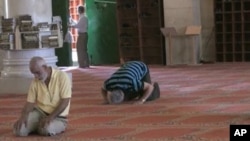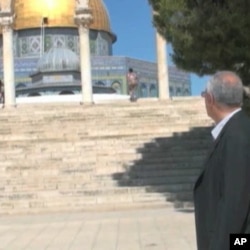Where barbed wire once separated Jordanian East Jerusalem and Israeli West Jerusalem, there are now rails.
The new light rail system will connect mainly-Jewish areas of East Jerusalem with Jewish West Jerusalem, stopping at some Arab neighborhoods in between.
For many of Jerusalem's Palestinian residents, the trains symbolize Israel's conquest of this land.
Mohamed Dajani's roots in this ancient city go back hundreds of years. "Jerusalem is a religious city and in this way, I believe in its history and I believe in its power, miraculous power to survive the ages. My future vision for Jerusalem is that it will be a city of peace, a model city of peace, where everybody can come," he said.
This chamber under the Dome of the Rock in the al Aqsa compound is where it is believed that Abraham was about to sacrifice his son to God. It is also the site of the ancient great temple of the Jews.
The Quran does not mention Jerusalem by name, but Muslims believe it refers to this spot when describing the place from which the prophet Mohamed made his night journey to heaven.
The prophets of Islam: Abraham, David, Solomon, and Jesus all walked here.
The armies of Islam arrived in the 7th century and took control of the city from Christians. By possessing it, Islam staked a claim on the birthplace of Judaism and Christianity.
Dajani can visit, but the mosque is unreachable to many Palestinians living behind Israel's security barrier.
The restriction is a thorn in the side for Jerusalem's Muslim clerics, who view Israel's control of East Jerusalem as a sacrilege. They say Muslim lands should be under full Muslim control.
Sheikh Muhammad Hussein is Jerusalem's grand mufti. "Of course, there is a big difference between Jordanian and Israeli rule. The Jordanian rule was a continuation of Islamic Arab rule in Palestine. Palestine and Jerusalem since the time of Caliph Omar was ruled by Muslims and this helped maintain the city as an Islamic city, except during the Crusader period," he said.
Much has changed over the past 44 years. Jewish residents have moved into what was Dajani's old neighborhood.
In West Jerusalem, the cemetery where his family's ancestral tomb is located has been taken over by an Israeli park.
This center of faith is a battleground, but Dajani says it does not have to be so. "Once Jews preach and practice Judaism, once Christians preach and practice Christianity, and once Muslims preach and practice Islam, this city will actually be a city of love, a city of mercy, a city of tolerance, and a city of peace. Until then, it is very difficult because here, what these people are fighting for is they are fighting over political power. They are fighting over the stone, not the man. I hope that one day we will fight for the soul of man, and for the man, rather for the stones and property," he said.
Arabs and Jews do mingle in Jerusalem's streets. But for the foreseeable future, it is an uneasy coexistence.
Part three of this three part series will be available July 20. Part one can be seen here.













